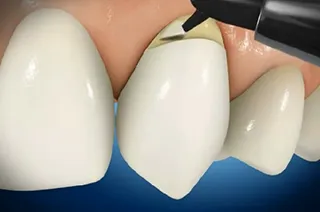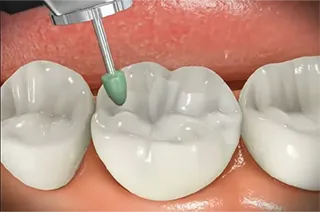Zirconia crowns in Tirana
What material is zirconia for crowns
According to Zirconia Association zirconia is a mineral found in nature. After extraction from earth its then manufactured to zirconium dioxide (Zr02) which is then widely used in many industries includin medicine and dentistry. Zirconia is known for its strengh on high temperatures and is used widely in many industries susch as electronics, medicine (hip and joint replacement) and dentistry (dental implants and dental crowns)


Zirconia vs Porcelain crowns
What are the pros and cons
Zirconia vs Porcelain Crowns: Understanding the Differences
Patients frequently have to compare zirconia and porcelain options when selecting the best kind of dental crown. Every material has a unique set of benefits and qualities. For your benefit, let’s examine the differences between zirconia and porcelain crowns so you can decide with confidence. Some key elements to consider when you chose between these two materials are :
1. Composition of the Material:
Zirconium oxide is a robust, long-lasting substance used to make zirconia crowns. This material has a reputation for being incredibly strong and resistant to breaking and chipping.
Porcelain Crowns: A particular kind of dental ceramic is used to create porcelain crowns, sometimes referred to as ceramic crowns. These crowns are highly valued since they resemble real teeth in terms of look and translucency.
2. Strength and Durability:
Zirconia Crowns: are a great option for replacing molars and teeth that are subjected to strong biting forces because of its well-known strength and longevity. If you compare them to porcelain crowns, they are less prone to chip or break.
Porcelain Crowns: Although porcelain crowns are quite resilient, they might not be as strong as zirconia crowns, particularly in parts of the mouth where there’s a lot of chewing force. Over time, porcelain crowns could be more prone to chipping or fracturing.
3. Aesthetics:
Zirconia Crowns: Although zirconia crowns can be created to look like your actual teeth in terms of color and shape, they might not be as translucent as porcelain crowns. On the other hand, zirconia materials now seem better thanks to technological developments.
Porcelain Crowns: Porcelain crowns are prized for their natural-looking appearance and ability to blend seamlessly with surrounding teeth. They offer excellent translucency and can be color-matched to achieve optimal aesthetics.
4. Tooth Preparation:
Zirconia Crowns: Since they can be precisely machined using digital impressions of your teeth, they require very little preparation of the tooth. More of your natural tooth structure is preserved when you use this cautious approach.
Porcelain Crowns: To accommodate the thickness of the crown material and produce the best possible aesthetics, porcelain crowns may require additional tooth reduction. Nonetheless, more cautious porcelain crown preparation methods have been developed as a result of technological developments in dentistry.
5. Biocompatibility:
Zirconia Crowns: Because it is a biocompatible substance, the body can take it well and there is a reduced chance of allergic responses or gum inflammation.
Porcelain Crowns: Porcelain is also considered biocompatible and is widely used in dentistry for its compatibility with oral tissues.
Being a strong material zirconia teeth can wear off the natural teeth during mastication. SInce when this phenomena was noticed by dentists the dental industry has tried to come up with different types of zirconia that match the strength of your natural teeth.
How long do they last?
Hygiene of the mouth: Consistent brushing and flossing will help keep your zirconia crowns and neighboring teeth in good condition. Maintaining good oral hygiene lowers the chance of gum disease, decay, and other problems that can shorten the life of dental restorations.
Diet and behaviors: Zirconia crown damage can be avoided by avoiding sticky or hard foods as well as habits like clenching or grinding teeth. These routines raise the possibility of chipping, cracking, or fracturing the crowns by putting them under undue stress.
Frequent dental visits: Keeping an eye on the state of your zirconia crowns and taking quick action to resolve any problems requires routine dental checkups and professional cleanings. During routine examinations, your dentist can spot wear, damage, or other issues and suggest
Dental Hygiene: Consistent brushing and flossing will help keep your zirconia crowns and neighboring teeth in good condition. Following good oral hygiene lowers the chance of gum disease, decay, and other problems that can shorten the life of dental restorations.
Diet: Zirconia crown damage can be avoided by avoiding sticky or hard foods as well as habits like clenching or grinding teeth. These habits increase the chance of chipping, cracking, or fracturing the crowns by putting them over undue stress.
How much do zirconia crowns cost?
When looking for dental prices in Tirana to get an estimate on zirconia crowns it is important to notice a few factors:
Expertise of the dentist: As in every other profession, the experience and the quality of work always cost more. The dentist has to make sure that the preparation of your teeth is minimal. Being conservative with a tooth is essential in its longevity. Also, the preparation of the tooth is best done using what’s called a shoulder. This is so the crown has a perfect feet with surrounding tissue, it avoids gum inflammation and insulates the prepared tooth from bacteria and saliva. Such preparation requires much more time to complete and therefore the cost could be higher compared to other types of methods.
Taxes and fees: They play a major role in increasing or decreasing the total cost. Zirconia crowns in Tirana and every other health related service is exempt from government taxes. A dental clinic in Tirana might charge anywhere from €180 to €250.
Do they change color?
Zirconia is baked in a special oven under 900 degrees celcius. This is done to increase its durability and aesthetics. The color will never change as its layers placed by the dental technician. However over time after 10 or more years their polished surface could sometimes slowly disapear. Thats why a dentist in Tirana will always recomend to replace them once every 10 – 15 years